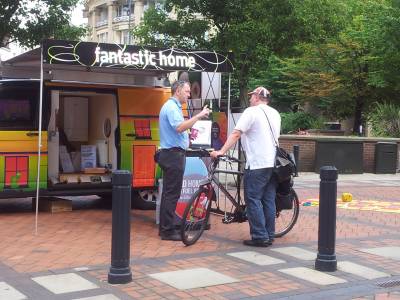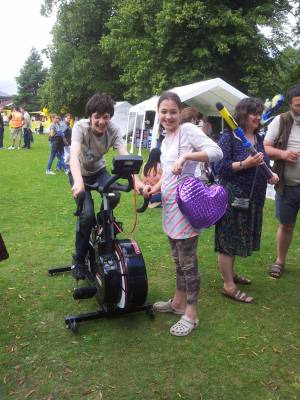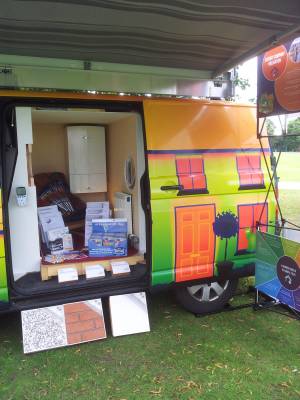News
Nottinghamshire EcoHome Open Days in September
Fri, 30 August 2013
Fantastic Home Delivers Energy Advice Across Nottinghamshire and Derbyshire
Mon, 12 August 2013The Fantastic Home, a mobile exhibition offering energy efficiency and domestic ren
 ewable advice, has visited a number of very sunny events across Nottinghamshire and Derbyshire over the last fortnight.
ewable advice, has visited a number of very sunny events across Nottinghamshire and Derbyshire over the last fortnight.
Beginning at a Family Fun Day in Derby, the exhibition moved on to Gunthorpe Summer Fayre, West Bridgford’s Lark in the Park and finally a summer event in Chesterfield’s Queen’s Park.
Hundreds of children (and some children-at-heart!) got a chance to have a go on our energy bike and play a game of Low Carbon Snakes and Ladders. Adults received advice on solid wall insulation, boilers, double and secondary glazing, loft and cavity wall insulation, domestic renewables, the Green Deal, ECO and more.
Over the next six weeks the exhibition will be visiting more venues across the two counties:
- 23rd August: Swadlincote town centre
- 1st September: Rush for Health, Rushcliffe Country Park and The Gedling Show



Children's Climate Change Games
Mon, 29 July 2013Children bored this summer? Download the Home Energy Saver Wordsearch, Low Carbon Countdown (a eco-twist on that old favourite Snakes and Ladders) and Use It or Lose It! Three games designed to keep them occupied and help them learn about how to tackle energy use.
| Attachment | Size |
|---|---|
| 10. fun and games1.pdf | 519.3 KB |
| 11. fun and games2.pdf | 843.95 KB |
One Third Would Invest in Community Renewables
Mon, 29 July 2013One third of people would consider personally investing in small-scale community renewable projects such as wind farms, solar farms or small-scale biomass plant according to a new poll by the Institute of Mechanical Engineers.
Of more than 2000 people surveyed, 25% would considering investing in Energy Bonds where the money would be used to build large energy infrastructure projects such as offshore wind.
Other significant finds included that 93% of the public is concerned about higher electricity and gas bills, 64% are worried about possible blackouts and 51% think the government should support the construction of more renewable energy sources like solar, wave and tidal power.
Dr Tim Fox, Head of Energy and Environment at the Institution of Mechanical Engineers, said: ‘Government must stop playing politics with our energy system and the environment and make clear exactly how it is going to ensure that the country’s future needs are affordably met. It is only with this clarity that energy companies will have the confidence to invest in the infrastructure needed to keep the nation warm, lit, moving and working.’
The people polled were asked about what types of technology they would favour to secure future energy supplies. Renewable energy sources like solar, wave and tidal power were the most popular, with 51% of people saying the Government should provide more support for these projects. 43% said there should be more support for offshore wind farms, 31% for onshore wind farms; while as few as 8% supported more gas-fired power stations.
www.imeche.org/news/archives/2013/06/13/energy_poll_blackouts
Rural Community Energy Fund Launches
Mon, 29 July 2013- Rural Community Energy Fund Launches
- Support Available for Community Groups
The Rural Community Energy Fund (RCEF) has been launched to support rural communities in England to develop renewable energy projects which provide economic and social benefits to the community.
The fund will provide up to approximately £150,000 of funding for feasibility and pre-planning development work to help projects become investment ready: approximately £20,000 to pay for an initial investigation into the feasibility of a renewable energy project followe by an unsecured local of up to approximately £130,000 to support planning applications and develop a robust business case to attract further investment. Community groups will need to pay back a set amount on top of the loan borrowed which will be rolled back into the fund to help support even more community energy projects across rural England.
Funding can be used to support rural projects across the renewable and low carbon energy spectrum including wind, solar, biomass, heat pumps, anaerobic digestion, gas Combined Heat and Power and hydro.
Two organisations are offering help to community groups looking to apply to the fund:
Centre for Sustainable Energy: www.cse.org.uk/news/view/1740
Nottingham Energy Partnership: www.nottenergy.com
